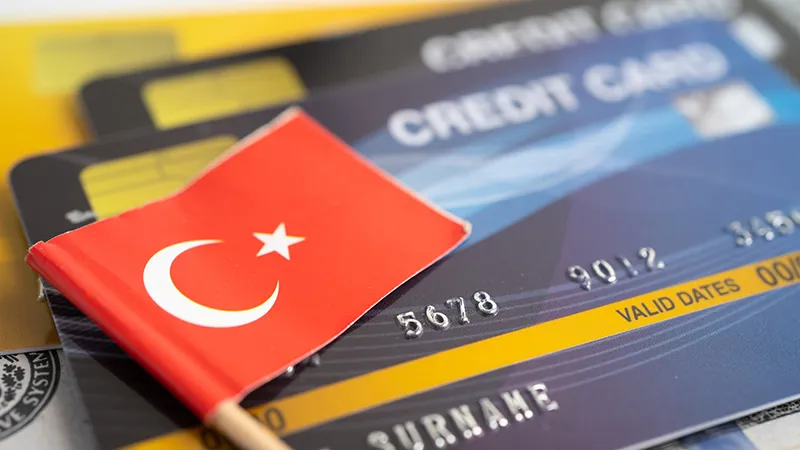For any foreign national intending to reside, invest, or conduct business activities in Turkey, obtaining a Turkish Tax Identification Number (Vergi Kimlik Numarası - VKN) and opening a local bank account are fundamental and crucial steps. These stages are not merely bureaucratic hurdles but serve as the primary foundations for compliance and seamless integration into Turkey's economic and social fabric. The Tax Identification Number, a ten-digit figure, is used for all administrative and legal transactions, including opening a bank account, purchasing property, subscribing to utility services, issuing insurance, benefiting from health services, conducting notary processes, and applying for a residence permit.
Having a bank account in Turkey also offers numerous practical benefits, such as receiving salaries, conducting local transactions, paying bills, making international fund transfers, and building a credit history in Turkey and is essential for key steps like paying the deposit (kapora) after signing the sales agreement. for investors or freelancers, it ensures efficient income receipt and smooth remittance operations. Therefore, opening a bank account is a very important step for foreign nationals and international companies seeking to invest, operate, or reside in the country, whether for personal savings, real estate transactions, or corporate banking.
A crucial point in this process is the interdependence between obtaining a tax ID and opening a bank account. The Tax Identification Number acts as a prerequisite for opening a bank account and performing almost any other official activity. This indicates that any delay or issue in obtaining the tax ID directly impacts the ability to open a bank account and, consequently, other vital activities such as purchasing property, subscribing to utility services, or business operations. Thus, the Tax Identification Number serves as the first and most absolute administrative step in this chain.
Section 1: Obtaining a Turkish Tax Identification Number (Vergi Kimlik Numarası - VKN)

Why is a Turkish Tax ID Essential?
The Tax Identification Number (VKN) for foreign nationals in Turkey plays a role beyond merely fulfilling tax obligations. This number is a fundamental identifier for almost all official interactions in Turkey. The VKN is used for "all administrative and legal transactions," including opening a bank account, completing the title deed (TAPU) transfer process, subscribing to utility services, issuing insurance, utilizing health services, conducting notary processes, and applying for a residence permit. This broad scope of application clearly demonstrates its importance.
The need for a VKN for "official activities" applies regardless of the intent for permanent residency, including students, workers, researchers, and retirees. This number acts as a "critical component for individuals, businesses, and legal entities... to comply with tax obligations" and is the "primary identification number for tax reporting, business operations, and various financial transactions," including filing income tax returns and VAT registration. These extensive uses indicate that the VKN is not solely for tax purposes but serves as a universal identifier for foreign nationals in Turkey, enabling access to a wide range of essential services and legal processes. This broad role means that the VKN is the most important initial administrative step for any foreign national intending long-term engagement in Turkey, as it activates almost every other official process.
Understanding VKN for Foreign Nationals
The Tax Identification Number (VKN) for foreign nationals in Turkey is a 10-digit number for businesses and "certain foreign individuals," distinguishing it from the National Identification Number (NIN), which is 11 digits and primarily for Turkish citizens. However, other sources provide more precise details, indicating that the VKN for individuals (both Turkish citizens and resident foreign nationals) is 11 digits, while for businesses and foreign entities, it is 10 digits. This number is used for all personal tax-related activities, such as income tax filing and social security contributions.
This discrepancy in the number of VKN digits across different sources can be somewhat confusing. However, more detailed and comprehensive information suggests that the VKN for individuals is 11 digits and for entities, it is 10 digits. This highlights the dynamic nature of regulatory information and the importance of consulting the latest and most accurate sources or professional legal advice to ensure accuracy and compliance. This report reflects the format presented in the more comprehensive source as the currently valid understanding.
Step-by-Step Guide: Online Application
The process of obtaining a VKN online is quick and easy, usually taking only 15 minutes. To apply online, applicants must visit the official website of the Digital Tax Office (Dijital Vergi Dairesi) at https://dijital.gib.gov.tr/. There, they should navigate to the "Potential Tax Identification Number Application" section and then select "Application for Non-citizens Potential Tax Number" option. A new window will open with the application form, which includes English translations alongside the Turkish text. The form must be filled out carefully in CAPITAL LETTERS, ensuring all required fields are correctly completed. After completion, the form is submitted by clicking the "APPLY" button and then "Tamam". The system then provides the Tax Identification Number as an official letter in PDF format. To receive the document, pop-up windows and cookies must be enabled in the browser.
Required documents for the online application include a valid Turkish phone number and a digital copy of the passport's identification page (in PDF, JPEG, or PNG formats and less than 1 MB in size). Although using a foreign phone number may be possible, having a Turkish phone number is recommended.
While both sources emphasize the ease and speed of the online application, the requirement for a "valid Turkish phone number" presents a practical hurdle for newcomers who may not yet have a Turkish SIM card. Although using a foreign number might be possible, the suggestion to use a Turkish number implies that for many, this "digital" option may still require a prior physical step (obtaining a SIM card). This could make the in-person option more practical initially for those without a local number or emphasizes the need to plan for obtaining a Turkish SIM card early in the process.
Step-by-Step Guide: In-Person Application

For those without a Turkish phone number or who prefer to apply in person, this option is available in all provinces and districts of Turkey. Applicants must visit the nearest or most convenient tax office. Inside the tax office, they should look for the "Sicil İşlemleri" (Registration Procedures) section.
Required documents for the in-person application include a valid passport, a photocopy of the passport's identification page, and a completed and signed tax ID number application form. The form must be filled out carefully, including the names of both parents (if one parent's name is unknown, 'Unknown' can be stated).
A significant consideration for in-person applications is the potential for language barriers. Tax office staff may not speak English, so it is advisable to bring someone proficient in Turkish and familiar with the procedures. Alternatively, one can carry a note stating: “Yabancı uyrukluyum ve vergi numarası almaya geldim. Yardımcı olabilir misiniz?” (I am a foreign national, and I am here to obtain a tax ID number. Could you help me?). Upon completion of the process, an official letter containing the Tax Identification Number is provided to the applicant.
The recommendation to bring a Turkish-speaking person or a pre-written phrase indicates a significant practical challenge for many foreign nationals that could lead to misunderstandings or delays. This underscores the considerable value of professional assistance or local contacts. Such help is not only for convenience but is often essential for overcoming a fundamental communication barrier and ensuring accurate document completion, thereby minimizing the risk of errors or application rejection.
Required Documents Checklist (for VKN)
Required Documents:
- Online Method:
- Digital copy of passport ID page (PDF, JPEG, or PNG, less than 1 MB)
- Valid Turkish phone number (foreign number possible, but Turkish recommended)
- In-Person Method:
- Valid passport
- Photocopy of passport ID page
- Completed and signed tax ID application form
Key Steps:
- Online Method:
- Visit Digital Tax Office website (dijital.gib.gov.tr)
- Select "Application For Non-Citizen's Potential Tax Number"
- Fill out form carefully (in CAPITAL LETTERS)
- Upload necessary documents
- Submit via "Tamam" button
- Enable pop-ups and cookies to receive PDF
- In-Person Method:
- Visit tax office (in all provinces and districts)
- Find "Sicil İşlemleri" (Registration Procedures) section
- Present necessary documents along with filled and signed form
- Recommended to bring a Turkish speaker or prepared note
Cost:
- Online Method: Free (excluding incidental costs like SIM card purchase)
- In-Person Method: Free (excluding incidental costs like photocopying and travel)
Time:
- Online Method: Approximately 15 minutes
- In-Person Method: Approximately 15 minutes
Language Considerations:
- Online Method: English interface on online form
- In-Person Method: Potential language barrier with staff
Key Considerations and Expert Tips (for VKN)
The process of obtaining a Tax Identification Number in Turkey is "completely free" and typically "quick and easy," with appointments often lasting 15 minutes. It is a one-time process, and once obtained, the VKN is "permanently" usable. If the document is lost or damaged, a reprint can be requested at the tax office or downloaded from the website. It is important to note that having a Tax Identification Number does not obligate one to pay taxes in Turkey; it is an administrative formality.
Although applying for a VKN is directly free, there are also hidden costs. These include photocopying fees, obtaining a Turkish phone number (if applying online), and travel expenses to the tax office. Additionally, consulting legal professionals or service companies (such as Ikamet) can be helpful in this process. These services, while not mandatory, offer significant value in navigating language barriers, ensuring accuracy, and saving time, especially for complex cases or individuals unfamiliar with Turkish bureaucracy. This shifts the understanding of "free" to "potentially low direct cost, but high value in professional support for efficiency and accuracy."
Section 2: Opening a Bank Account in Turkey

The Critical Role of a Local Bank Account
Having a bank account in Turkey is vital for foreign nationals, extending beyond mere financial transactions to encompass integration and compliance. This account enables receiving salaries, conducting local transactions, paying bills, securely transferring funds to Turkey for your property purchase, and building a credit history in Turkey. For expatriates, it simplifies rent and utility bill payments; for investors and freelancers, it ensures efficient income receipt and smooth remittance operations.
This step is "very important" for foreign nationals and international companies seeking to invest, operate, or reside in the country, whether for personal savings, real estate transactions, or corporate banking. Furthermore, obtaining a tax ID "opens up additional opportunities" such as opening a Turkish bank account (even remotely) and accessing other essential financial and legal services. Therefore, a Turkish bank account is not merely a tool for daily transactions; it is a fundamental instrument for financial integration into the Turkish economy, essential for long-term residency, investment, and ensuring compliance with local financial regulations. It is a crucial step towards establishing a legal and traceable financial footprint in the country.
Navigating the Turkish Banking System as a Foreign National
The Turkish banking system offers various account types, including personal current accounts, savings accounts, foreign currency accounts, and investment accounts, each with its specific features. The general process involves selecting a suitable bank, preparing the required documentation, visiting a branch (or using digital channels if available), and completing the application. Turkish banks welcome foreign customers, especially given the high volume of tourism and the presence of expatriate professionals.
Digital banking services in Turkey have advanced significantly in recent years, with many banks offering online or mobile banking applications with English-language interfaces, making it more convenient to manage accounts remotely. Some banks allow non-residents to open accounts with minimal documentation, especially if the purpose is property investment, education, or digital employment. However, initial setup often requires in-person verification or valid e-signature processes. This indicates that while Turkey has embraced digital banking for daily operations and convenience, the initial account opening process for foreign nationals often retains a significant physical component due to regulatory requirements (e.g., Know Your Customer - KYC and Anti-Money Laundering - AML). This means that entirely remote setup without specific legal representation or prior physical presence remains challenging.
Prerequisites: Turkish Tax ID and Other Essentials
The Tax Identification Number (VKN) is a primary prerequisite for opening a bank account in Turkey. In addition to the VKN, other documents may be required depending on the bank and the applicant's profile, including a passport, proof of address (in Turkey or abroad), and in some cases, a residence permit. Turkish lawyers can confirm whether a tax ID, valid residence permit, or local address is needed based on the bank selection.
This suggests that while the tax ID is a clear and consistent prerequisite, there is a layered system of prerequisites. The need for a valid residence permit or local address "depending on your bank selection" implies a tiered system of requirements based on the bank's internal policies and the applicant's profile (e.g., resident vs. non-resident, account purpose, bank-specific risk assessment). Therefore, foreign nationals should be prepared for varying requirements across different banks and understand that merely having a tax ID may not be universally sufficient. A residence permit or proof of local address could be additional hurdles requiring careful bank selection or professional guidance to identify banks that align with their current status.
Required Documents Checklist for Individuals and Companies
Opening a bank account in Turkey requires submitting verified documents, which vary depending on the applicant's profile.
Required Documents for Opening a Bank Account in Turke
Individuals:
- Passport: Must be valid
- Tax Identification Number (VKN): Essential
- Proof of Address: In Turkey or abroad
- Residence Permit: May be required in some cases
- Translated Declarations: May require translation and notarization
- Proof of Income: May be required
- Notarized Forms: May be required
Companies:
- Corporate Registration
- Signature Circular
- Trade Registry Extract
- Tax Certificate
- Power of Attorney
- Notarized Trade Registry Extracts: Prepared by legal firm
- Notarized Signature Circulars: Prepared by legal firm
- Tax IDs (VKN)
- Foreign Ownership Declarations: Prepared by legal firm
Legal firms can assist in collecting, notarizing, and translating all documents to ensure compliance with BDDK and MASAK rules. They also ensure that each form meets bank-specific compliance checklists.
Step-by-Step Process: From Bank Selection to Account Activation

The process of opening a bank account in Turkey for foreign nationals and companies involves several steps, often requiring expert guidance:
- Initial Assessment and Bank Selection: This stage involves evaluating the applicant's profile (individual or corporate) and matching it with suitable banks that offer international services, multi-currency accounts, and online banking. At this stage, the need for a tax ID, valid residence permit, or local address is confirmed based on the bank selection.
- Document Preparation and Notarization: All necessary documents are collected, notarized, and translated to ensure compliance with BDDK (Banking Regulation and Supervision Agency) and MASAK (Financial Crimes Investigation Board) rules.
- Identity Verification: Some banks require "face-to-face" identity verification, while others accept online onboarding. Turkish lawyers can confirm whether physical presence is necessary or if a notarized power of attorney is sufficient. They also advise on e-signature registration and bank meeting appointments.
- Account Activation and Support: For corporate accounts, most Turkish banks require in-person attendance of a board member or representative for account activation, although some allow power of attorney. Ongoing support includes managing annual KYC renewals and board resolution filings for corporate banking continuity.
- Online Banking Setup: Assistance to expatriates in setting up digital bank accounts, including mobile onboarding and remote verification processes, and help with setting up Turkish IBANs, debit cards, and secure digital access.
- Tax Reporting and Compliance: Advice on FATCA, CRS, and Turkish income reporting rules, coordination with accountants and tax advisors to ensure full compliance, and preparation of legal memoranda and declarations for use with Turkish banks, tax offices, and foreign tax authorities.
- Escrow Account Setup (if applicable): For real estate purchases, investments, or large transfers, bank escrow structures are set up, agreements are drafted, bank correspondence is supervised, and funds are ensured to be released only after contractual conditions are met.
- Citizenship by Investment Banking (if applicable): Assistance to investors pursuing the Turkish citizenship program by buying property in Istanbul or other cities, which includes opening government-compliant bank accounts for real estate payments, capital deposits, and state fund transfers, ensuring documentation aligns with relevant guidelines.
- Account Closure (if applicable): For foreign nationals leaving Turkey or restructuring their businesses, advice on bank closure notifications, fund withdrawals, and legal documentation to finalize the banking relationship, ensuring proper legal clearance.
These complex steps indicate that for individuals with intricate needs (e.g., property investment, citizenship by investment) and especially for companies, utilizing legal consultation is not merely a convenience but a strategic necessity. This ensures compliance, prevents delays, and streamlines the intricate legal and regulatory path, ultimately guaranteeing a "secure and lawfully sound" process. This level of support transforms a potentially difficult process into a simplified and legally robust one.
Understanding Compliance and Regulatory Bodies (BDDK, MASAK)
Foreign nationals must comply with "Turkish banking regulations and documentation requirements." The two main regulatory bodies in this regard are:
- Banking Regulation and Supervision Agency (BDDK): This agency sets the "banking regulations and documentation requirements" that foreign nationals must adhere to.
- MASAK (Financial Crimes Investigation Board): Documents must comply with "MASAK rules."
The explicit mention of BDDK and MASAK indicates a robust and vigilant regulatory environment in Turkey's financial sector. MASAK, in particular, emphasizes a strong national focus on Anti-Money Laundering (AML) and combating financial crimes. This means banks will have stringent Know Your Customer (KYC) procedures, and foreign nationals should be prepared for thorough scrutiny of their documents and financial backgrounds. Non-compliance can lead to significant delays, account application rejection, or even legal issues, underscoring the critical need for accurate, complete, and verifiable documentation from the outset.
Special Considerations: Digital Banking, Remote Opening, and Professional Assistance
Turkey offers a modern banking system with online and mobile banking services in multiple languages, making financial access easier for foreign nationals. However, while there are "advanced digital banking services" and "online or mobile banking applications with English-language interfaces" , "initial setup often requires in-person verification or certified e-signature processes." Some banks may allow non-residents to open accounts with minimal documentation, especially for purposes such as property investment, education, or digital employment.
This creates a paradox: digital access for managing an account is high, but initial remote opening is limited without legal intervention. "Face-to-face identity verification" versus "online onboarding" and the possibility of a "notarial proxy" are discussed. Legal firms can assist expatriates in opening digital bank accounts, including mobile onboarding and remote verification processes.
This implies that "true" remote account opening for foreign nationals is often not a simple self-service option. Instead, it is effectively facilitated through legal professionals who can act as proxies (via a power of attorney) or guide clients through complex e-signature processes. This makes legal assistance a key enabler for those unable to travel to Turkey for initial account setup, transforming a logistical challenge into a manageable process.
Conclusion and Strategic Recommendations: Streamlining Your Entry into Turkey's Financial Landscape

Obtaining a Tax Identification Number (VKN) and opening a bank account in Turkey are fundamental steps for any foreign national intending to reside, work, invest, or even retire in the country. These two processes not only serve as legal requirements but also as gateways to accessing a wide range of essential services and full integration into Turkish society.
The Tax Identification Number (VKN) acts as a universal identifier, essential for almost all administrative and legal transactions, including opening a bank account, purchasing property, and accessing utility and health services. While the process of obtaining a VKN, whether online or in-person, is relatively quick and free, the requirement for a Turkish phone number for online applications and the potential for language barriers in in-person applications can pose challenges. These points indicate that even in seemingly simple processes, preparation and a precise understanding of the details can make a significant difference in the applicant's experience.
Opening a bank account is also a vital step, extending beyond mere daily financial management to include building a credit history and complying with Turkish financial regulations. Despite digital advancements, the Turkish banking system often requires in-person identity verification for initial setup. Document requirements, including VKN, passport, proof of address, and in some cases a residence permit, can vary depending on the bank and the applicant's profile.
To streamline entry into Turkey's financial landscape, proactive planning and a thorough understanding of the requirements are paramount. This proactive approach minimizes delays, frustrations, and the likelihood of application rejection, ultimately accelerating the foreign national's integration into Turkey's administrative and financial systems.
Strategic Recommendations:
- Prioritize VKN Acquisition: Prioritize obtaining a Tax Identification Number before any other financial or administrative action. This number is the key to accessing many other services.
- Meticulous Document Preparation: Carefully collect and prepare all necessary documents for both VKN and bank account, including digital copies, photocopies, and certified translations if required.
- Review VKN Application Options: If you do not have a Turkish phone number, be prepared for an in-person application and, if possible, bring someone proficient in Turkish or prepare essential phrases.
- Research and Select a Bank: Before visiting, research different banks and their specific requirements for foreign nationals. Some banks may have simpler processes for non-residents or for specific purposes.
- Consider Professional Assistance: For more complex processes such as corporate account opening, large investments, or if unable to be physically present, strongly consider utilizing the services of specialized lawyers or consulting firms. These professionals can assist in navigating complex regulations, notarizing documents, translating, and even performing processes via power of attorney, ensuring full compliance with BDDK and MASAK regulations. For many, a pro-con analysis of using a lawyer versus going solo makes it clear that professional help is a valuable investment.
- Be Aware of Incidental Costs: While some processes are stated as "free," be prepared for incidental costs such as photocopying, obtaining a SIM card, or travel expenses.
By following these recommendations and adopting an organized approach, foreign nationals can navigate the initial stages of entering Turkey with greater confidence and efficiency, laying the necessary groundwork for their residency, investments, or business activities.

 USD
USD
 TRY
TRY
 EUR
EUR
 IRR
IRR
 RUB
RUB

Comments